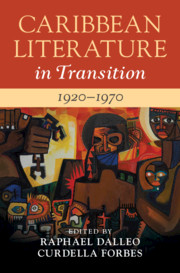Book contents
- Caribbean Literature in Transition, 1920–1970
- Caribbean Literature in Transition
- Caribbean Literature in Transition, 1920–1970
- Copyright page
- Contents
- Figure
- Contributors
- Introduction
- Part I Literary and Generic Transitions
- Part II Cultural and Political Transitions
- Part III The Caribbean Region in Transition
- Chapter 12 A Moving Centre
- Chapter 13 Canadian Routes
- Chapter 14 New Empires
- Chapter 15 Africa and the Caribbean
- Chapter 16 Cross-Caribbean Dialogues I
- Chapter 17 Cross-Caribbean Dialogues II
- Part IV Critical Transitions
- Bibliography
- Index
Chapter 14 - New Empires
The Caribbean and the United States
from Part III - The Caribbean Region in Transition
Published online by Cambridge University Press: 16 December 2020
- Caribbean Literature in Transition, 1920–1970
- Caribbean Literature in Transition
- Caribbean Literature in Transition, 1920–1970
- Copyright page
- Contents
- Figure
- Contributors
- Introduction
- Part I Literary and Generic Transitions
- Part II Cultural and Political Transitions
- Part III The Caribbean Region in Transition
- Chapter 12 A Moving Centre
- Chapter 13 Canadian Routes
- Chapter 14 New Empires
- Chapter 15 Africa and the Caribbean
- Chapter 16 Cross-Caribbean Dialogues I
- Chapter 17 Cross-Caribbean Dialogues II
- Part IV Critical Transitions
- Bibliography
- Index
Summary
While the story of Caribbean literature in English generally focuses on its emergence in relation to Great Britain, Caribbean writers also urgently explored the Caribbean’s relationship to the United States. US imperialism in the region was most explicit with the US presence in Cuba and Puerto Rico after the Spanish-American War, in the occupations of Haiti and the Dominican Republic in the 1910s to 1930s, and in its post-World War II involvement in various territories. Caribbean migration into the US fuelled the alliances that Brent Hayes Edwards describes as ‘the practice of diaspora’. In the 1920s, Caribbean activists and writers such as Hubert Harrison, Claude McKay, and Eric Walrond helped shape the Harlem Renaissance. That movement’s aesthetic experiments and pan-African identifications inspired the development of literature within the region. The United States was also a hub from which some writers travelled to other parts of the world (Russia, France, the UK) and became part of a network of mutual influences. US writers such as Langston Hughes and Zora Neale Hurston travelled to the Caribbean. Later, the ranks of the predominantly male writers in the United States were expanded with the emergence of women writers such as Audre Lorde and Paule Marshall, and growing Caribbean immigration to the US coupled with the rise of US cultural institutions meant that the US location continued to influence Caribbean writing.
Keywords
- Type
- Chapter
- Information
- Caribbean Literature in Transition, 1920–1970 , pp. 225 - 240Publisher: Cambridge University PressPrint publication year: 2021

